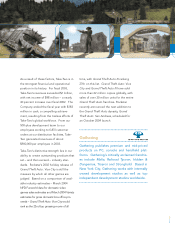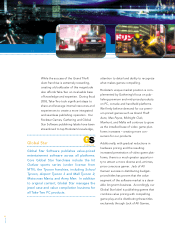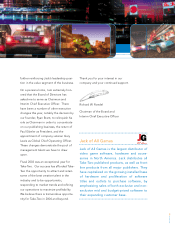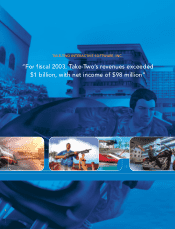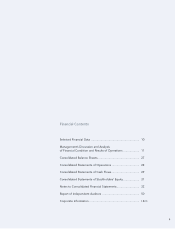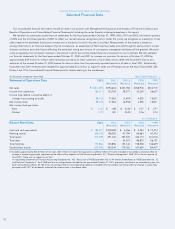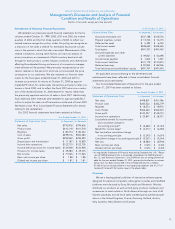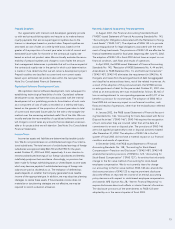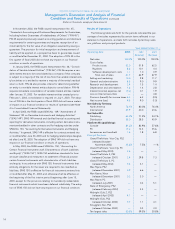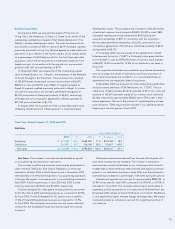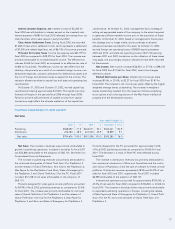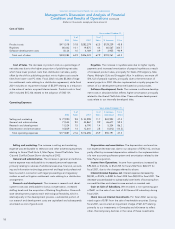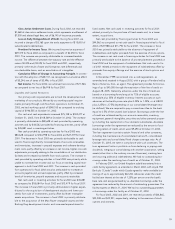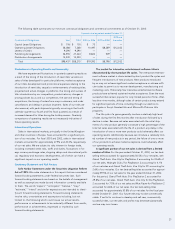2K Sports 2003 Annual Report Download - page 15
Download and view the complete annual report
Please find page 15 of the 2003 2K Sports annual report below. You can navigate through the pages in the report by either clicking on the pages listed below, or by using the keyword search tool below to find specific information within the annual report.
Prepaid Royalties
Our agreements with licensors and developers generally provide
us with exclusive publishing rights and require us to make advance
royalty payments that are recouped against royalties due to the
licensor or developer based on product sales. Prepaid royalties are
amortized as cost of sales on a title-by-title basis, based on the
greater of the proportion of current year sales to total of current and
estimated future sales for that title or the contractual royalty rate
based on actual net product sales. We continually evaluate the recov-
erability of prepaid royalties and charge to cost of sales the amount
that management determines is probable that will not be recouped at
the contractual royalty rate in the period in which such determination
is made or if we determine that we will cancel a development project.
Prepaid royalties are classified as current and non-current assets
based upon estimated net product sales within the next year. See
Note 3 to Consolidated Financial Statements.
Capitalized Software Development Costs
We capitalize internal software development costs subsequent to
establishing technological feasibility of a title. Capitalized software
development costs represent the costs associated with the internal
development of our publishing products. Amortization of such costs
as a component of cost of sales is recorded on a title-by-title basis,
based on the greater of the proportion of current year sales to total
of current and estimated future sales for the title or the straight-line
method over the remaining estimated useful life of the title. We con-
tinually evaluate the recoverability of capitalized software costs and
will charge to cost of sales any amounts that are deemed unrecover-
able or for projects that we will abandon. See Note 3 to Consolidated
Financial Statements.
Income Taxes
Income tax assets and liabilities are determined by taxable jurisdic-
tion. We do not provide taxes on undistributed earnings of our interna-
tional subsidiaries. The total amount of undistributed earnings of foreign
subsidiaries was approximately $60,700 and $41,900 for the years
ended October 31, 2003 and 2002, respectively. It is our intention to
reinvest undistributed earnings of our foreign subsidiaries and thereby
indefinitely postpone their remittance. Accordingly, no provision has
been made for foreign withholding taxes or United States income taxes
which may become payable if undistributed earnings of foreign sub-
sidiaries are paid as dividends to us. The realization of deferred tax
assets depends on whether the Company generates future taxable
income of the appropriate type. In addition, we may adopt tax planning
strategies to realize these assets. If future taxable income does not
materialize or tax planning strategies are not effective, we may be
required to record a valuation allowance.
Recently Adopted Accounting Pronouncements
In August 2001, the Financial Accounting Standards Board
(“FASB”) issued Statement of Financial Accounting Standards No. 143,
“Accounting for Obligations Associated with the Retirement of Long-
Lived Assets” (“SFAS 143”). The objective of SFAS 143 is to provide
accounting guidance for legal obligations associated with the retire-
ment of long-lived assets. The provisions of SFAS 143 are effective for
financial statements issued for fiscal years beginning after June 15, 2002.
The adoption of SFAS 143 in fiscal 2003 did not have an impact on our
financial condition, cash flows and results of operations.
In April 2002, the FASB issued Statement of Financial Accounting
Standards No. 145, “Rescission of FASB Statements No. 4, 44 and 64,
Amendment to FASB Statement No. 13, and Technical Corrections”
(“SFAS 145”). SFAS 145 eliminates the requirement (in SFAS No. 4)
that gains and losses from the extinguishments of debt be aggregated
and classified as extraordinary items, net of the related income tax. As
a result of the adoption of this pronouncement, the $1,948 net loss
on extinguishment of debt for the year ended October 31, 2001 clas-
sified as an extraordinary item was reclassified as follows: $3,165 of
loss on extinguishment to non-operating expenses and $1,217 of tax
benefit to provision for income taxes. The adoption of SFAS 145 in
fiscal 2003 did not have any impact on our financial condition, cash
flows and results of operations, other than the reclassification referred
to above.
In January 2002, the FASB issued Statement of Financial Account-
ing Standards No. 146, “Accounting for Costs Associated with Exit or
Disposal Activities” (“SFAS 146”). SFAS 146 requires the recognition
of such costs when they are incurred rather than at the date of a
commitment to an exit or disposal plan. The provisions of SFAS 146
are to be applied prospectively to exit or disposal activities initiated
after December 31, 2002. The adoption of SFAS 146 in the first
quarter of fiscal 2003 did not have a material impact on our financial
condition and results of operations.
In December 2002, the FASB issued Statement of Financial
Accounting Standards No. 148, “Accounting for Stock-Based
Compensation—Transition and Disclosure” (“SFAS 148”). SFAS 148
amends the transition provisions of FASB No. 123, “Accounting for
Stock-Based Compensation” (“SFAS 123”), for entities that voluntarily
change to the fair value method of accounting for stock-based
employee compensation. We do not currently intend to change
our accounting to the fair value method. SFAS 148 also amends the
disclosure provisions of SFAS 123 to require prominent disclosure
about the effects on reported net income of an entity’s accounting
policy decisions with respect to stock-based employee compensation
and amends APB Opinion No. 28, “Interim Financial Reporting” to
require disclosures about such effects in interim financial information.
The disclosure provisions of the amendments to FASB 123 were
adopted by us in the second quarter of fiscal 2003.
13


